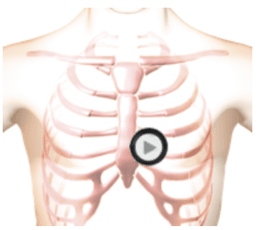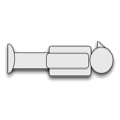Moderate Tricuspid Stenosis Lesson
Where to Auscultate


The patient was supine during auscultation.
Description
This lesson presents moderate tricuspid stenosis. The first heart sound has increased intensity due to moderate thickening of the tricuspid valve leaflets. The second heart sound is normal and unsplit. Systole is silent.
This murmur includes a tricuspid opening snap which is followed by a diamond-shaped low-frequency murmur. There is a second murmur in late diastole due to the right atrium contraction. For this condition, the murmur intensity and tricuspid opening snap increase with inspiration.
Auscultate with the bell of the stethoscope.
In the cardiac animation, observe the turbulent blood flow from the right atrium into the right ventricle. Also observe the moderately thickened tricuspid valve leaflets and the moderately enlarged right atrium. The excursion of the tricuspid valve leaflets is moderately decreased. Moderate tricuspid stenosis is most commonly due to rheumatic heart disease.
Phonocardiogram
Anatomy
Moderate Tricuspid Stenosis
Authors and Sources
Authors and Reviewers
-
Heart sounds by Dr. Jonathan Keroes, MD and David Lieberman, Developer, Virtual Cardiac Patient.
- Lung sounds by Diane Wrigley, PA
- Respiratory cases: William French
-
David Lieberman, Audio Engineering
-
Heart sounds mentorship by >W. Proctor Harvey, MD
- Special thanks for the medical mentorship of Dr. Raymond Murphy
- Reviewed by Dr. Barbara Erickson, PhD, RN, CCRN.
-
Last Update: 11/10/2021
Sources
-
Heart and Lung Sounds Reference Library
Diane S. Wrigley
Publisher: PESI -
Impact Patient Care: Key Physical Assessment Strategies and the Underlying Pathophysiology
Diane S Wrigley & Rosale Lobo - Practical Clinical Skills: Lung Sounds
- PESI Faculty - Diane S Wrigley
-
Case Profiles in Respiratory Care 3rd Ed, 2019
William A.French
Published by Delmar Cengage -
Essential Lung Sounds
by William A. French
Published by Cengage Learning, 2011 -
Understanding Lung Sounds
Steven Lehrer, MD
-
Clinical Heart Disease
W Proctor Harvey, MD
Clinical Heart Disease
Laennec Publishing; 1st edition (January 1, 2009) -
Heart and Lung Sounds Reference Guide
PracticalClinicalSkills.com